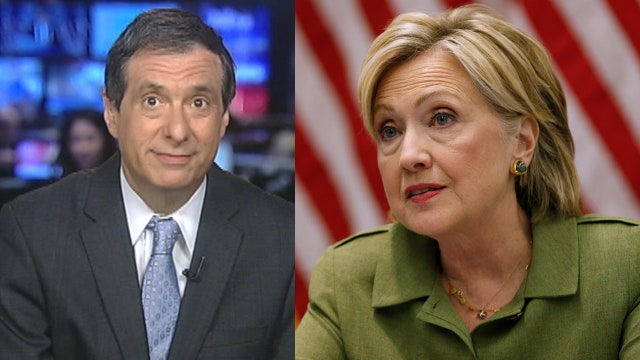Kurtz: Why Clinton attacks on the AP are unfair
'MediaBuzz' host Howard Kurtz weighs in on the Clinton campaign accusing the Associated Press of bias and distortion
Hillary Clinton’s greatest self-inflicted wound is bleeding again.
And this time the stain is spreading, even across media outlets that have played down the controversy for months.
I believe the press got bored with the email mess as it dragged on for more than a year. The story also got bogged down at times by increasingly legalistic debates over what qualified as classified info and whether the former secretary of State had sent or received it.
The buzz grew louder as the FBI was wrapping up its probe, speculation intensified about whether she’d be indicted, and James Comey contradicted much of what Clinton had said and accused her of being extremely careless with classified messages.
But then it seemed to be over, except that a separate probe involving the Clinton Foundation was still kicking around.
The latest developments, in my view, are more damaging. They clearly show a cozy, favor-seeking environment between Clinton’s family foundation and the State Department she was running. And that’s an easier narrative to understand.
The individual cases, about this or that foundation donor or foreign businessman, require some digging into the weeds. But the overall picture is coming into sharp focus.
Clinton, by continuing to avoid interviews and press conferences, is trying to avoid fanning the flames. But that just allows the pressure to build up.
The Democratic nominee hasn’t done an interview since her post-convention session with Chris Wallace, and subsequent admission at the National Association of Black Journalists that she had “short-circuited” during one of her answers about the email debacle and the FBI. Well, she did sit down with Jimmy Kimmel, who let her get away with saying: "Jimmy, my emails are so boring. And I'm embarrassed about that. They're so boring. So we've already released, I don't know, 30,000 plus, so what's a few more?"
The staying-off-TV strategy limits Hillary’s ability to push out her message, although if it means more Donald Trump stories, her campaign seems just fine with that.
But the big papers are starting to pay more attention. The Washington Post:
“A sports executive who was a major donor to the Clinton Foundation and whose firm paid Bill Clinton millions of dollars in consulting fees wanted help getting a visa for a British soccer player with a criminal past.
“The crown prince of Bahrain, whose government gave more than $50,000 to the Clintons’ charity and who participated in its glitzy annual conference, wanted a last-minute meeting with Secretary of State Hillary Clinton.
“U2 rocker and philanthropist Bono, also a regular at foundation events, wanted high-level help broadcasting a live link to the International Space Station during concerts.”
In each case, “the requests were directed to Clinton’s deputy chief of staff and confidante, Huma Abedin, who engaged with other top aides and sometimes Clinton herself about how to respond.”
The New York Times: “The dispute over Hillary Clinton’s email practices now threatens to shadow her for the rest of the presidential campaign after the disclosure on Monday that the F.B.I. collected nearly 15,000 new emails in its investigation of her and a federal judge’s order that the State Department accelerate the documents’ release.
“As a result, thousands of emails that Mrs. Clinton did not voluntarily turn over to the State Department last year could be released just weeks before the election in November.”
The big bombshell is the Associated Press piece on the Clinton Foundation, and that has drawn accusations of distortion from the Hillary camp.
The wire service said “at least 85 of 154 people from private interests who met or had phone conversations scheduled with Clinton while she led the State Department donated to her family charity or pledged commitments to its international programs.”
That, at the very least, looks bad. But Clinton campaign manager Robby Mook, whose candidate doesn’t often get the relentless media scrutiny trained on Donald Trump, says the story “relies on utterly flawed data. It cherry-picked a limited subset of Secretary Clinton's schedule to give a distorted portrayal of how often she crossed paths with individuals connected to charitable donations to the Clinton Foundation.”
Mook went on to say that Clinton would have met with people like Melinda Gates even if she hadn’t been a foundation donor, and that’s probably true. It’s also true that no one has yet made a slam-dunk case that the secretary changed policy on behalf of a foundation donor.
But here’s the deal: The AP acknowledged using calendars from only half of Clinton’s tenure--because that’s all the State Department would provide after a lawsuit filed by the media outlet. And the story said it didn’t include federal employees or foreign government officials because as secretary it was her job to meet with them. All the AP said is that given “the intermingling of access and donations,” the overlap “fuels perceptions that giving the foundation money was a price of admission for face time with Clinton.” And that seems a perfectly fair statement.













































